No matter how tough we try to portray ourselves, every human is scared of one thing or Another. What sets a reasonable fear apart from a phobia is the intensity of the fear and the effect it has on a person’s daily life.
A phobia is a deep, exaggerated fear of a specific thing or situation. There are several types of specific phobias that are common and a few that are rare. Each phobia, whether specific or not, has a particular name derived from Greek origin.
In this article, we will discuss having a fear of birds . It is known as ornithophobia.
A lot of people think phobias are unreal, but they actually are one of the most popular kinds of anxiety disorders.
The National Institute of Mental Health (NIMH) has estimated that more than 12 percent of adults in the United States suffer a specific phobia at one point or another in their lives.
If you are dealing with ornithophobia, you may suffer intense anxiety when you think about birds or if you are around birds.
Read further to learn more about ornithophobia, its associated symptoms, and how best you can manage it with or without help.
What causes ornithophobia?
Phobias can form at any age, even though most of them often develop during a person’s childhood. It is still unclear what exactly leads to specific phobias.
Some of the potential causes of specific phobias may include any of the following:
Personal experiences
If you had a specific encounter or negative experience that involved birds, such as being attacked by a flood of birds, you might develop a deep fear of them.
Observational learning
If your sibling, parents, or anyone else who is close to you suffers from ornithophobia, you may copy or learn that fear from such people.
Information learning
Hearing or reading about a harmful or dangerous situation that involves birds may trigger a deep fear of them.
Genetics
Every human processes anxiety and fear differently. Some individuals may be born with a higher tendency to be anxious than other people.
What are the symptoms of ornithophobia?
The symptoms exhibited by a specific phobia, such as a fear of birds, can be categorized into physical and psychological groups.
You may notice that you deal with some of these symptoms when you see a bird or think of one.
People who have a specific phobia may deal with their fears or take measures to avoid such worries. For example, a person with ornithophobia may avoid visiting a local park or area that’s home to a lot of waterfowl or pigeons.
How do you treat ornithophobia?
There are several ways to treat orinthophobia, and meeting with a mental health professional will also a long way to help you learn how to manage your phobia. Treatment for orinthophobia may involve a single method or sometimes a combination of methods.
Psychotherapy
This is a type of treatment that helps to teach a person with phobia ways to cope with their fears and react differently to any situation that may cause them fear or anxiety.
You may be made to learn some coping methods like relaxation or breathing techniques that you can use whenever you are in an anxiety-inducing situation.
You will also be taught how your thought patterns and unrealistic fears negatively affect your behaviors and emotions.
Your therapist will work step-by-step with you to help change such beliefs and your reaction to what you fear.
Another part of the therapy process you may have to undergo may be exposure therapy, which can also be termed systemic desensitization.
Exposure therapy aims to change how you respond to an object or a situation that you fear, and it involves gradual exposure to whatever you fear.
For example, after you tell your therapist about your fear of birds, he or she may begin with having you think about a parrot or other birds, then gradually progress to looking at images of various birds, and move toward making you go near to a bird or touch an actual bird.
Medication for ornithophobia
Sometimes, medications may help to lessen the feeling of panic or anxiety that you may have developed as a result of your ornithophobia.
Some of the medications that your therapist may prescribe include:
Antidepressants
Antidepressants known as selective serotonin reuptake inhibitors (SSRIs) can sometimes be used for treating anxiety. Examples include Zoloft, Prozac, and Paxil.
Sedatives
Also known as benzodiazepines, these drugs can help you feel calm and relaxed. They’re typically used for short-term treatment. Examples include Valium and Xanax.
Beta-blockers
Often used as a treatment of cardiovascular conditions, these drugs can help with several symptoms of anxiety-like a rapid heartbeat.
What’s the outlook?
A specific phobia like ornithophobia can easily be managed with proper treatment. If you opt for treatment such as medications or psychotherapy, the outlook is positive.
To obtain the best results, it is vital to stick to the treatment plan your therapist has developed for you. Working hand-in-hand with your therapist, you can easily overcome your phobia of birds.
The bottom line
Ornithophobia is an intense fear of birds. People who have ornithophobia deal with extreme, exaggerated anxiety or fear when you think about birds or when you are around birds.
People dealing with phobias often know that their fears are exaggerated and unreasonable, but it feels as if they can’t control them.
Specific phobias like ornithophobia can easily be treated through methods like medications or psychotherapy.
Receiving proper and timely treatment and following through with your treatment plan can go a long way to help control your phobia.
We hope that you found this article helpful. If you want to share contributions or comments, please do not hesitate to leave them below this article. We look forward to hearing from you.








